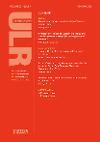Utilities Law Review - Volume 22 - Issue 4

Articles
The status of antitrust law in the United States: a personal view
Richard J. Pierce, Jr
Professor of Law, George Washington
University, Washington, D.C.
In this article Professor Pierce contrasts the extremely ambitious goals of antitrust law that many of the candidates for the Democratic nomination for US President have embraced with the far more modest goals that US enforcement agencies, courts and scholars have attempted to further for the past 40 years. The Democratic candidates want antitrust law to protect small firms from large firms, protect workers and their salaries, increase the number and quality of jobs, redistribute wealth, avoid concentration of political power in large firms, and protect personal privacy. By contrast, antitrust enforcement agencies, scholars and courts have long pursued the more modest goal of improving social welfare as measured through application of traditional tools of microeconomics. The author is not willing to predict the results of any attempt by a newly elected president to use antitrust law to further such an ambitious economic and political agenda. But he is willing to predict that the president would encounter a great deal of resistance from US courts if he or she attempts to use antitrust law to further goals other than improving social welfare by improving the performance of competitive markets as measured through use of traditional micro economic metrics.
Justifications of refusal of access in the energy and telecoms sectors: in search of a unifying analytical framework
Dr Tjarda D.O. van der Vijver
Senior Associate, Allen & Overy LLP, Amsterdam
This article examines the interrelationship between competition law and sector-specific regulation, focusing on the energy and telecoms sectors. It describes how competition law may, under certain conditions, force network operators to provide access to third parties. At the same time, network operators may rely on several potential justifications in order to refuse such access. This article examines the type of justifications that are available under competition law, and argues that it would be commendable to adopt the same categorisation for sector-specific regulation as well.
Case Comments
Ofgem’s differing fortunes in recent High Court challenges
Andrew Lidbetter and Jasveer Randhawa
Herbert Smith Freehills LLP
The authors consider the High Court’s approach to judicial reviews against regulators. They compare two recent challenges to the Gas and Electricity Markets Authority,finding that regulators are afforded a wide degree of discretion within their areas of expertise but that the court is more willing to intervene once the subject matter goes beyond this.
Some reflections on regulatory authorities after the entry into force of the European Electronic Communications Code
Paul Edgar Micallef
University of Malta
This comment considers the role of national regulatory authorities following the EU Electronic Communications Code published in December 2018. Points discussed relate to the norms in the Code which serve to ensure the independence of such authorities, including norms establishing the criteria for the selection of those heading such authorities, how they may be removed from office, and the relationship of such authorities with stakeholders and government.
Vodafone Malta Limited vs Awtorita ta’ Malta dwar il-Komunikazzjoni
Paul Edgar Micallef
University of Malta
The Administrative Review Tribunal rejected an appeal by Vodafone Malta Ltd contesting a regulatory decision which held that GO plc, the former incumbent, no longer enjoyed significant market power in the retail access to public fixed telephony network market. The Tribunal did not uphold Vodafone’s pleas that serious procedural errors had been committed and as a result of the regulatory decision effective competition in the market was negatively impacted.
EU Current Survey
Edited by Peter Alexiadis and Christoph Raab
Gibson, Dunn & Crutcher LLP, Brussels
Energy – Telecommunications and Digital Economy – Transport.
UK Current Survey
Edited by Philippa Young
Solicitor, Oxford
Energy – Telecommunications – Transport – Water
